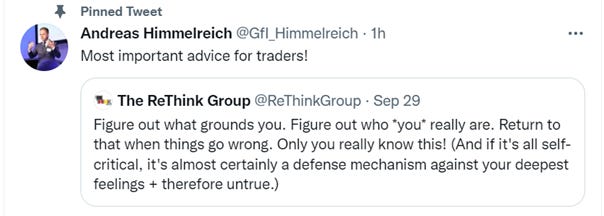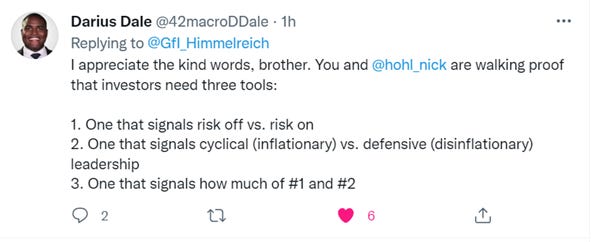Emotions
Embrace!
My port printed an all-time high yesterday, lets see!
Positions (in order of weighting).
XLE (new)
QRHC
MG
USDP
GDP
DLA
CRAI
SMLP
HCCI
TRNS
EPSN
TGA
HSON
BYDDY
PHX
SIM
CTHR
UNG (new)
RCMT
URG(HB)
LMRXF(HB)
CCJ
SGMA
ISENF(HB)
FISOF(HB)
To the subject.
Emotions.
First, I would like to point out he Cynefin model from Dave Snowden in order to explain where most trader have a very bad start in embracing their emotions: https://en.wikipedia.org/wiki/Cynefin_framework
Read that article on Wikipedia, it’s really good.
Let’s just define the two spaces complicated and complex.
Complicated (https://en.wikipedia.org/wiki/Cynefin_framework) à
“The complicated domain consists of the "known unknowns". The relationship between cause and effect requires analysis or expertise; there are a range of right answers. The framework recommends "sense–analyze–respond": assess the facts, analyze, and apply the appropriate good operating practice.[2] According to Stewart: "Here it is possible to work rationally toward a decision, but doing so requires refined judgment and expertise. ... This is the province of engineers, surgeons, intelligence analysts, lawyers, and other experts. Artificial intelligence copes well here: Deep Blue plays chess as if it were a complicated problem, looking at every possible sequence of moves." [ Stewart, Thomas A. (November 2002). ["How to Think With Your Gut". Business 2.0. pp. 4–5. Archived from the original on 5 November 2002. Retrieved 13 July 2019.]
Complex:
“The complex domain represents the "unknown unknowns". Cause and effect can only be deduced in retrospect, and there are no right answers. "Instructive patterns ... can emerge," write Snowden and Boone, "if the leader conducts experiments that are safe to fail." Cynefin calls this process "probe–sense–respond".[2] Hard insurance cases are one example. "Hard cases ... need human underwriters," Stewart writes, "and the best all do the same thing: Dump the file and spread out the contents." Stewart identifies battlefields, markets, ecosystems and corporate cultures as complex systems that are "impervious to a reductionist, take-it-apart-and-see-how-it-works approach, because your very actions change the situation in unpredictable ways” ["How to Think With Your Gut". Business 2.0. pp. 4–5. Archived from the original on 5 November 2002. Retrieved 13 July 2019.]
The first mistake traders and especially investors do, they think markets are complicated. But they are not, they are complex. Complex means, there are no stable correlations (big mistake billions of academics made to assume markets are complicated and trying to solve it with linear math!), no stable cause and effect. Yes, it might be stable for a time, but then things change, and you need to change with the things changing.
Math can not explain Tesla or Bitcoin. Only perception of the masses can. The masses are people and people are complex not complicated.
Emotions
Everything I learned about this subject is from @DeniseKShull, give her a follow.
Also read her book https://www.amazon.de/Market-Mind-Games-Psychology-Investing/dp/0071756221/ref=sr_1_1?__mk_de_DE=%C3%85M%C3%85%C5%BD%C3%95%C3%91&dchild=1&keywords=denise+shull&qid=1633082601&sr=8-1
It’s a very hard read but it’s worth it.
If, and most ones do, one has the expectation that markets must be all about stable correlations, linear cause and effects then this is the first thing one needs to change.
The first step is to embrace the uncertainty of the complex system we call the market.
Embrace uncertainty of markets and embrace uncertainty of life. I used to feel, that the world owes me something if I just work hard enough. Today I know that is not be the case. I can be the most diligent trader in the world, and I can still not reach my goals. I, family and friends can get very sick today. At ease with this! We are dying anyway; in 200 Years nobody will remember us. I could have 10 Million in 5 Years, or I could be broke. Or be gone because of cancer. The world does not owe me anything, no matter how hard I work. That’s all fine, life is not perfect, markets are not perfect.
Embracing uncertainty and the feelings that come with it is the first step.
The first step is to feel all your feelings (without any judgement!) as hard as you can. Fear, fatigue, shame, confidence, hunger, thirst, sleep deprivation: feel it!
Give your emotions room. If you do not, they will hunt you 1000 times harder and affect your life badly.
If you do, you emotions are your biggest advantage in life and in markets.
I am scared to death right now. I am all in with 25% leverage. Just look at the chart of the SP500. Very scary.
I give that feeling as much room as possible. It tells me, watch out, if your analysis (based on all the instruments I am using and my intuition) is wrong, and that is to be proven by the tape of the market, you better scale back. I say to that feeling I hear you loud and clear and I will manage risk based on the tape every day! It then fades in a way, gives room to intuition so that I can operate in my A-Game.
Do I feel greedy now? No. And that tells me I might be on to something with my intuition.
If I would feel greedy: I watch out and scale back.
There is a great discussion in the “Unknown Markets Wizards” book from Jack Schwager about feelings and trading.
As a trader you need all you feelings. If you feel all your feelings without judgement all the time one will learn (a lifelong process!) to differentiate between impulse feelings and intuition. Just so much: impulse feelings are loud, intuition is more silent, deeper.
If one suppresses feelings, the impulse feelings will hunt you that hard, that you have no access to your intuition. But you need you intuition to master complex systems.
I love quant trading systems; I love artificial intelligence. But only in combination with intuition. Everybody (with monster work ethic) can build systems like Darius Dale (Founder and CEO of 42macro.com). But that is not why I am booking him. He sees the Data – at least that is my interpretation – and his intuition in order to interpreting it is unbelievable.
Not enough for my feelings, so I build my own systems (technically very similar to Darius’ Framework, not as sophisticated but good for feeling the tape) and I get a feeling about the market myself. If we are congruent, e.g. I see what he is seeing that’s a very good sign (as of now!).
I do not want to steal the work from Denise Shull, so just one more thing.
Darius had a great tweet on what is needed in markets.
I agree 100%.
But I used to follow him and could not pull the trigger. Why the hell could I not pull the trigger?
I had a 30% drawdown in 2018 (Darius warned exactly before the selloff) and a 55% drawdown in 2021 (same Darius warned just in time!). I listened but I could not get myself to pull the trigger and get defensive. If I would have, I would have around 1-1.5 Million more trading-capital now.
In 2020 I just quit a 300k Dollar CEO Job to be a trader and the first thing that happened was a 55% Drawdown. Yikes!
Then I did not get aggressive enough from November 2020 – March 2021. That was the bull ride of a lifetime. I know trader who made 100% in 2020! And I was not one of them.
I used to say to myself: how stupid can you be to have access to such a great market caller and still not get it. And I judged myself so hard I was out of the market from March (at the bottom!) to November 2021!
The answer is: I oppressed my emotions, mostly my fear and in the moment of heat that feeling came back so hard that I could not act anymore. And I thought complicated not complex regarding markets. Because I wanted them extremely hard to be complicated though they are complex. That got me into trouble!
How many of us are not able to follow the tape? How many of us want the market to be complicated (e.g., solvable with linear math!).
One can have the best systems, the best data, the best subscriptions to the best services and we still fail.
I am not saying I am there already. Not at all.
But I tell you Denise Shull changes my life. For the better. For the much better.
All the best to you and intuition-deep trading.



